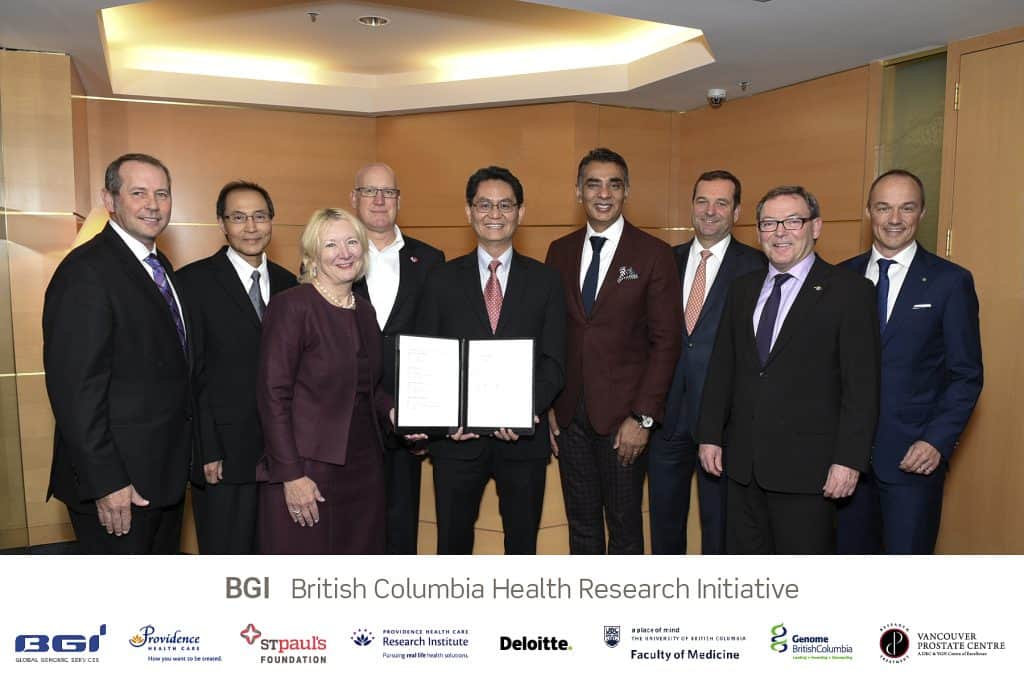Precision medicine to be a focus of research partnership; longer term plan includes study of genomics in individualized cancer therapies
Precision medicine. Health economic evaluation. Genomics. Three of the most exciting, promising and forward-looking trends in medicine.
St. Paul’s is at the vanguard of all three.
Early planning is now underway between the Centre for Health Evaluation and Outcome Sciences at St. Paul’s (CHÉOS) and BGI, one of the world’s foremost genomics organizations, to engage in a research partnership in which precision medicine will be an area of focus.
Precision medicine is the emerging approach to disease treatment and prevention that takes into account genetic makeup, along with factors such as environment and lifestyle, to allow doctors and researchers to predict more accurately which strategies will work in which groups of people.
Rich research histories on both sides
Since the establishment of CHÉOS in 1998, the field of health economic evaluation has grown steadily. The health economic evaluation conducted at CHÉOS is the kind of work that helps to make new treatments affordable, for individual patients as well as at population levels.
BGI (Beijing Genomics Institute) was formed in 1999 to provide China with representation in the Human Genome Project. It has since become one of the world’s key genome sequencing centres.
Now, these two leaders—CHÉOS in health economic evaluation and BGI in genomics—are coming together with their respective areas of expertise to study precision medicine.
How does CHÉOS benefit patients?
To think of the complex health economic evaluations conducted at CHÉOS, with teams of scientists working through seemingly endless economic formulas and equations, one may wonder where the patient comes in. But once the fundamental objectives behind the work are understood, it becomes clear that CHÉOS, in fact, is all about the patient.
“Health care costs a lot,” says Dr. Wei Zhang, Program Head of Health Economics at CHÉOS and a project leader on the CHÉOS-BGI research partnership, “so we must allocate our limited resources in a rational way. For example, a drug that is cost prohibitive may be more effective among certain segments of a population only. If we determine that will be the case, it becomes part of the evidence we present.”
In BC, according to Dr. Zhang, it is ultimately the Ministry of Health that decides whether it is willing to pay for a treatment. But today, economic evidence produced at CHÉOS is an important part of those decision making processes and helps pave the way toward the development of affordable medical services.
“In Canada,” Dr. Zhang continues, “it used to be that approval from Health Canada was all that was needed. Decisions were made on clinical effectiveness only. Now, cost effectiveness of treatments is reviewed. You need to justify that the treatments have value, that is, the more cost-effective your drugs, your diagnostic tests or your surgical procedures are.”
Early project goals
While long-term plans will include a focus on individualized therapy for cancer through evidence-based precision oncology, as well as the diagnostics and treatment of prostate and other cancers, the partnership’s early goals, over these initial two years, remain rooted in the research component.
“As CHÉOS is a research centre, our first objective will be to have good, publishable research findings,” says Dr. Zhang, “and we will want to examine these findings so we can have ways to translate this new knowledge to help patients as well as policymakers and other stakeholders.”
Health experts are excited at the prospect of genomics and its ability to advance and accelerate precision medicine, which can be more cost effective than the traditional “one treatment for all” approach that has long defined health care.
St. Paul’s Foundation is proud to be a supporter of CHÉOS and to be a part of this exciting project. Friends of St. Paul’s are encouraged to lend their support to the vital and groundbreaking work of CHÉOS today.
